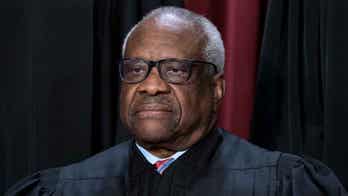
A detainee walks inside a yard at the detention facility at Guantanamo Bay May 31, 2010. (Reuters)
In what would have been the latest in a string of cases stemming from the U.S. government's War on Terror, the Supreme Court passed on an opportunity to hear arguments that would have further determined the legal rights of the detainees kept at the Guantanamo Bay military camp in Cuba.
The petition the justices turned away Monday asked them to establish the standards of evidence lower court judges should use to determine if the detainees can remain locked up while waiting for their cases to be heard.
Unlike the other cases the high court was asked to resolve in recent years that ultimately rejected the Bush administration's attempts to administer justice, this case was presented as unfinished business from its 2008 ruling that said the prisoners have a right to challenge their detention in a federal court. The 5-4 ruling in Boumediene v. Bush written by Justice Anthony Kennedy left unanswered how federal judges should rule over that process.
This case specifically challenged the admissibility of hearsay evidence and the standard judges should use in determining if the government has sufficiently proved its case to keep a detainee locked up indefinitely.
David Cynamon, lawyer for Fawzi Khalid Abdullah Fahad al-Odah, said U.S. District Court Judge Colleen Kollar-Kotelly gave the government too much leeway with introducing evidence he described as "largely consisting of subjects about whom little or nothing is known, most of which were taken years after the fact under undisclosed circumstances by unknown interrogators whom the government did not make available for cross-examination or to answer interrogatories."
Cynamon also objected to what he thinks is a low threshold standard Kollar-Kotelly used to determine that the government could continue to imprison al-Odah. He says Kollar-Kotelly's handling of the case, which was largely guided by the order of a fellow judge tasked with coordinating al-Odah's case with scores of other similar challenges, has undermined through procedural unfairness, the high court's ruling in Boumediene.
The judge's decision was upheld by the D.C. Circuit U.S. Court of Appeals last year. Cynamon says both decisions were built on a shaky foundation "allowing wholesale reliance on hearsay without regard to the standards of admissibility....and by applying a standard of proof ill-suited for deciding whether a person should spend potentially the rest of his or her life in prison."
Some detainees like al-Odah have been on the island for more than nine years waiting for their cases to be heard by a military commission or some other legal tribunal.
The Obama administration, which entered office on a high-profile agenda to change policies on handling the Guantanamo detainees, asked the high court to turn away al-Odah's request.
In his brief asking the justices to deny review, Deputy Solicitor General Edwin Kneedler argued that the district court properly performed its task in accordance with Boumediene and "nothing in the Constitution or any other source of law requires the application of different standards or procedures."
Kneedler defended Kollar-Kottelly's assessment that al-Odah should remain in military custody, in part, based on the detainee's own admission that he had military training at a Taliban camp in Afghanistan and was in the Tora Bora mountains during the battle there.
Now retired Justice John Paul Stevens was viewed as the court's driving force in its prior War on Terror decisions. Because the court announced its decision to deny review without comment, it's not clear how many justices, if any, voted to take the case. Supreme Court rules require that at least four justices must agree to hear a case to grant further review.
The justices also denied the similar appeal of detainee Adham Mohammed Awad.
The court took no action on a pending appeal by the five remaining Chinese Muslims, known as Uighurs, who remain in Cuba but want to relocate to the United States. The government says they are free to leave at any time but have turned down offers of at least two countries for repatriation.




